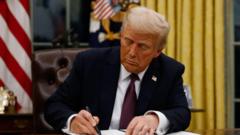The change signals a significant strategic pivot for Meta as it prepares for a possible Trump presidency, aspiring to enhance user growth while acknowledging possible risks.
Meta Shifts Approach to Fact-Checking, Embraces User Moderation

Meta Shifts Approach to Fact-Checking, Embraces User Moderation
Meta will cease its third-party fact-checking program and switch to user-generated notes system on its platforms.
In a notable shift, Meta Platforms, Inc. announced that it will discontinue its third-party fact-checking initiatives across Facebook, Instagram, and Threads. Instead, the company is set to launch a system allowing users to add their own notes to content that could be determined as false or misleading. This change mirrors a similar approach used by competing platform X.
Meta's Chief Executive Officer, Mark Zuckerberg, indicated that this turn in strategy aims to return to the company's foundational principles of free expression, which he argues have been compromised by existing missteps in the current system due to overreach in moderation. As a result of this decision, users can expect an increase in misleading content on their feeds, a consequence of what Zuckerberg termed a “trade-off” to also protect less controversial posts from being taken down.
The announcement appears to have pleased former President Donald Trump, who noted during a press conference at his Mar-a-Lago residence that Meta had "come a long way." Trump further implied that this change came partially in response to previous threats he made against the organization, emphasizing the support from his conservative base who often felt targeted by the previous fact-checking policies. Following this announcement, numerous digital rights organizations publicly condemned Meta's decision, citing worries over the potential spread of misinformation.
With this controversial move, Meta demonstrates a strategic maneuver to recalibrate its relations with political figures and prepare for the unfolding of potentially significant changes in leadership. The implementation of this user-centric method is expected to begin in the United States within the coming months, setting the stage for a new era of content moderation on social media platforms.
Meta's Chief Executive Officer, Mark Zuckerberg, indicated that this turn in strategy aims to return to the company's foundational principles of free expression, which he argues have been compromised by existing missteps in the current system due to overreach in moderation. As a result of this decision, users can expect an increase in misleading content on their feeds, a consequence of what Zuckerberg termed a “trade-off” to also protect less controversial posts from being taken down.
The announcement appears to have pleased former President Donald Trump, who noted during a press conference at his Mar-a-Lago residence that Meta had "come a long way." Trump further implied that this change came partially in response to previous threats he made against the organization, emphasizing the support from his conservative base who often felt targeted by the previous fact-checking policies. Following this announcement, numerous digital rights organizations publicly condemned Meta's decision, citing worries over the potential spread of misinformation.
With this controversial move, Meta demonstrates a strategic maneuver to recalibrate its relations with political figures and prepare for the unfolding of potentially significant changes in leadership. The implementation of this user-centric method is expected to begin in the United States within the coming months, setting the stage for a new era of content moderation on social media platforms.























